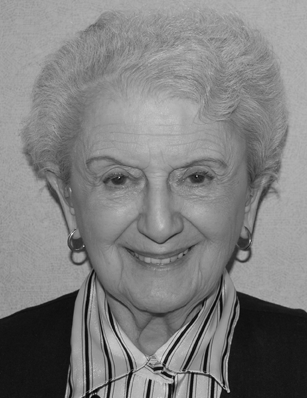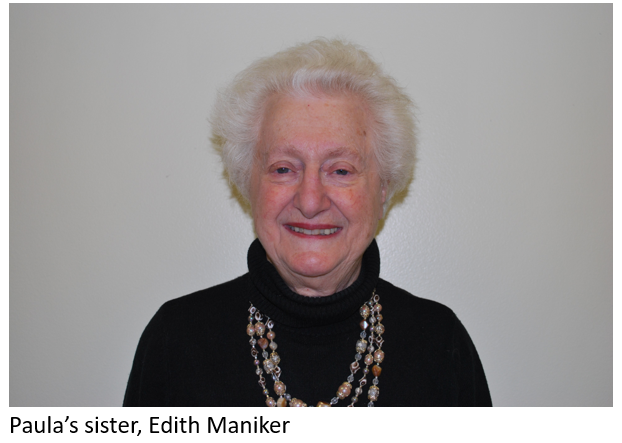Paula Balkin
"I tried not to think about it. I lost my whole family. Now I can talk about it. This should never happen again. "
Name at birth
Paula Grunbaum
Date of birth
06/03/1924
Where did you grow up?
Leipzig, Germany until June 1939
Name of father, occupation
Abraham Grunbaum,
Printer, compositor, translator (translated Hebrew texts into German and German into Hebrew)
Maiden name of mother, occupation
Gertrude Schmulevitz,
Homemaker
Immediate family (names, birth order)
Parents and my sister Edith Grunbaum Maniker
How many in entire extended family?
Maternal grandparents – Cantor Samuel and Rose Schmulevitz; aunts and uncles – Leo who married Eva, Yette who married Leo, and Clara who married Abraham (Adolp) Koppold; and cousins – Vera, Harold, Siegman, and Zilla
Who survived the Holocaust?
Six children who escaped on the Kindertransport- my sister and I and our first cousins-Vera,Harold,Siegman and Zilla
My earliest memories reflect the strong and extended family ties surrounding me. I lived in an apartment flat one floor away from my maternal grandparents and two away from my Aunt Yette and cousin Vera Ribetski, In 1936, the Kindertransport Program began through which approximately 10,000 young people were saved by putting them on unescorted trains headed for England where they would be placed in children’s caps and foster homes. My Uncle Leo was in charge of this in my hometown. His efforts ensured that my sister, four cousins and I escaped.
I left Leipzig in June 1939 and was taken in by my mother’s first cousin, Dora Binke, in London. One month later, my sister came to London and moved in with Dora’s daughter, Rosie Jacobson. On August 22, 1939, eleven days before the war broke out, my three other first cousins left on the Kindertransport and also moved in with the Binkes. I always made sure my sister and cousins were taken care of.
In August of 1939, the Refugee Committee, to avoid the expected bombing in London, evacuated my cousins, sister and I to Cambridge and then to Devon. In the spring of 1940, I returned to London to live with the Binkes. Letters from my family in Germany stopped at the end of 1940 and I was desperate to learn about their condition.
I went back and forth between Cambridge and London and always made sure my sister and cousins were in safe homes. After three years in London, with the constant bombing and air raids, my sister and I moved back to Cambridge and lived in a hostel arranged through the Refugee Committee. Zilla joined us and we stayed there until it closed in the summer of 1945.
After the war, I extended my search for my parents and learned my father was killed in Dachau in April 1945, two weeks before the end of the war. Only in 1993, did I give up the search for my mother’s plight, based on the Red Cross’ suggestion.
Much of this information was gathered from strong family ties, A story in “Letters,” a book compiled by Paula herself. In the prologue, written in 2002, Paula wrote, “With the completion of this I can finally make a stronger peace with this part of my life. But it is here ready to be opened again and read by those who want to know more about how togetherness and strong caring ties make a family.” She concluded, “This is my memorial to a caring, loving family. May their memories be for a blessing.”
When did you come to the United States?
In July 1947, Edith, Zilla and I received our visas and immigrated to the United States. Zilla was given up for adoption and was raised by the Schnall family so that she would be a “well-raised” child.
Where did you settle?
Detroit, Michigan.
How is it that you came to Michigan?
Edith and I came to Detroit to live with our father’s youngest brother. We stayed with him for two to three weeks until we found jobs and moved into a room not far from his home.
Occupation after the war
Bookkeeper for my husband’s electrician business
When and where were you married?
July 1948
Spouse
Tommy Balkin,
Electrician
Children
Harold, Michael, and Trudy
Grandchildren
Seven: Ethan, Eli, Elana, Aaron, Avi, Jeremy, and Shira
What message would you like to leave for future generations?
I tried not to think about it. I lost my whole family. Now I can talk about it. This should never happen again.
Interviewer:
Charles Silow
Interview date:
04/06/2011
Experiences
Survivor's map


